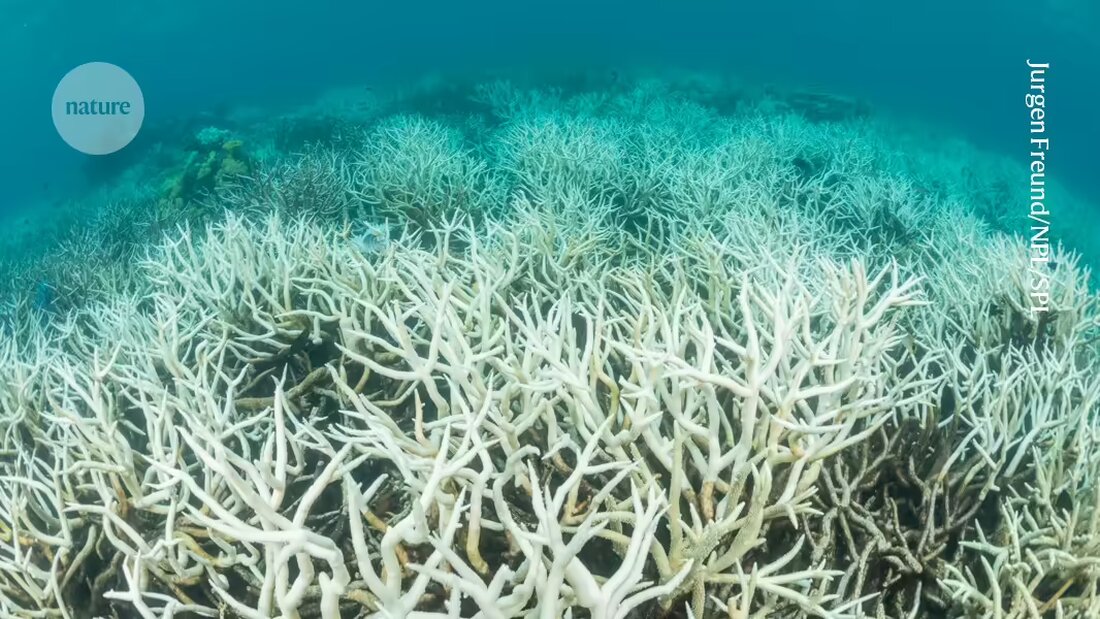Earlier this year, Australia's Great Barrier Reef boiled at temperatures higher than anything it has experienced in at least four centuries, climate researchers said. The results – which they have todayNaturepublished 1and attribute to man-made climate change – come as scientists rush to assess the effects of the to understand the most intense and extensive coral bleaching event ever recorded on the 2,300 kilometer long reef complex.
“We now have a long-term record that shows how extreme these recent events are,” says Ben Henley, a climatologist at the University of Melbourne in Australia and lead author of the studyNature-Study. Henley and his colleagues determine past
Sea temperatures on the Great Barrier Reef by drilling and chemically analyzing coral skeletal cores at 22 locations in the vast reef complex.
Corals usually bleach when stressed by high temperatures: They expel the colorful algae that live within them and provide them with energy through photosynthesis. Depending on the severity and duration of the bleaching event
corals can recover or die, threatening the biodiverse ecosystems that provide habitat for fisheries, attract tourists and protect coastlines from storms.
The trend uncovered in the latest study is clear: around the turn of the century, after industrialization began, sea temperatures on the reef began to rise steadily. And over the past two decades, temperatures have risen sharply
increased, with five of the six warmest years in the 407-year sea level record occurring since 2016 and corresponding to major bleaching events.
Uncertain implications
The study comes out almost at the same time as the Australian Institute of Marine Science (AIMS) in Townsville, his latest report published on the state of the Great Barrier Reef including data from aerial and underwater surveys of corals conducted since a massive bleaching event earlier this year
became. This analysis, published August 7, contains some encouraging news: Many areas of the reef have recovered since 2016, when a major bleaching event led to widespread coral mortality.
But researchers warn that the impacts of this year's mass bleaching event are not fully captured in the report and that scientists may not get a full picture of coral mortality for another 6-9 months. Around
30-50% of the reefs surveyed from the air are still at risk, says Neal Cantin, a coral biologist at AIMS who helped with the surveys.
“Corals can stay bleached and survive for a while, so we won’t know the full impact until we go through the recovery phase,” Cantin says. “But if we continue to experience this level of accelerated warming and more frequent
If we see bleaching events, that recovery process will deteriorate quite quickly.”
Hot water
The newestNaturestudy focuses on annual mean temperatures from January to March, when sea temperatures on the reef peak. This year, the surface temperature of the Coral Sea peaked during this period
an average of 1.73°C above the 1618-1899 average, according to the new coral skeleton record. Henley and his colleagues modeled Earth's climate both with and without historical greenhouse gas emissions and found that the
Record ocean warming trend would not have been possible without human activity.
The researchers believe the evidence could potentially force UNESCO, the United Nations educational, scientific and cultural organization, to take action Decision this year to reconsider not adding the Great Barrier Reef to the list of World Heritage Sites in Danger
to record.
The study results are concerning, "but not surprising," says Robert Streit, a reef ecologist at the University of Melbourne. The Australian government has unveiled a plan to invest billions of dollars Reef conservation measures to invest in helping corals adapt to warmer waters, but Streit questions whether this will be enough to address the destruction caused by global warming. "Generate
Do we have false hopes that science can solve these problems?”
Henley says it is clear that the reef will not survive in its current form if temperatures continue to rise, and that raises important questions about what will remain in the coming decades. “I think it's likely that
Great Barrier Reef will be a very different place in 20-30 years,” he says.

 Suche
Suche
 Mein Konto
Mein Konto

